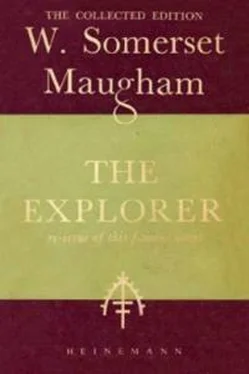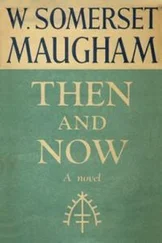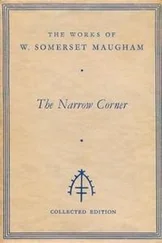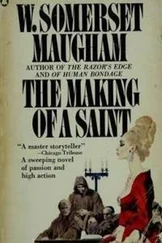Уильям Моэм - The Explorer
Здесь есть возможность читать онлайн «Уильям Моэм - The Explorer» весь текст электронной книги совершенно бесплатно (целиком полную версию без сокращений). В некоторых случаях можно слушать аудио, скачать через торрент в формате fb2 и присутствует краткое содержание. Год выпуска: 2014, Издательство: epubBooks Classics, Жанр: Классическая проза, на английском языке. Описание произведения, (предисловие) а так же отзывы посетителей доступны на портале библиотеки ЛибКат.
- Название:The Explorer
- Автор:
- Издательство:epubBooks Classics
- Жанр:
- Год:2014
- ISBN:нет данных
- Рейтинг книги:3 / 5. Голосов: 1
-
Избранное:Добавить в избранное
- Отзывы:
-
Ваша оценка:
- 60
- 1
- 2
- 3
- 4
- 5
The Explorer: краткое содержание, описание и аннотация
Предлагаем к чтению аннотацию, описание, краткое содержание или предисловие (зависит от того, что написал сам автор книги «The Explorer»). Если вы не нашли необходимую информацию о книге — напишите в комментариях, мы постараемся отыскать её.
The Explorer — читать онлайн бесплатно полную книгу (весь текст) целиком
Ниже представлен текст книги, разбитый по страницам. Система сохранения места последней прочитанной страницы, позволяет с удобством читать онлайн бесплатно книгу «The Explorer», без необходимости каждый раз заново искать на чём Вы остановились. Поставьте закладку, и сможете в любой момент перейти на страницу, на которой закончили чтение.
Интервал:
Закладка:
Lucy hoped that she would induce him to talk of the work he had done, and the work upon which he was engaged. With her mind fixed always on great endeavours, his career interested her enormously; and it gained something mysterious as well because there were gaps in her knowledge of him which no one seemed able to fill. He knew few people in London, but was known in one way or another of many; and all who had come in contact with him were unanimous in their opinion. He was supposed to know Africa as no other man knew it. During fifteen years he had been through every part of it, and had traversed districts which the white man had left untouched. But he had never written of his experiences, partly from indifference to chronicle the results of his undertakings, partly from a natural secrecy which made him hate to recount his deeds to all and sundry. It seemed that reserve was a deep–rooted instinct with him, and he was inclined to keep to himself all that he discovered. But if on this account he was unknown to the great public, his work was appreciated very highly by specialists. He had read papers before the Geographical Society, (though it had been necessary to exercise much pressure to induce him to do so), which had excited profound interest; and occasionally letters appeared from him in Nature , or in one of the ethnographical publications, stating briefly some discovery he had made, or some observation which he thought necessary to record. He had been asked now and again to make reports to the Foreign Office upon matters pertaining to the countries he knew; and Lucy had heard his perspicacity praised in no measured terms by those in power.
She put together such facts as she knew of his career.
Alec MacKenzie was a man of considerable means. He belonged to an old Scotch family, and had a fine place in the Highlands, but his income depended chiefly upon a colliery in Lancashire. His parents died during his childhood, and his wealth was much increased by a long minority. Having inherited from an uncle a ranch in the West, his desire to see this occasioned his first voyage from England in the interval between leaving Eton and going up to Oxford; and it was then he made acquaintance with Richard Lomas, who had remained his most intimate friend. The unlikeness of the two men caused perhaps the strength of the tie between them, the strenuous vehemence of the one finding a relief in the gaiety of the other. Soon after leaving Oxford, MacKenzie made a brief expedition into Algeria to shoot, and the mystery of the great continent seized him. As sometimes a man comes upon a new place which seems extraordinarily familiar, so that he is almost convinced that in a past state he has known it intimately, Alec suddenly found himself at home in the immense distances of Africa. He felt a singular exhilaration when the desert was spread out before his eyes, and capacities which he had not suspected in himself awoke in him. He had never thought himself an ambitious man, but ambition seized him. He had never imagined himself subject to poetic emotion, but all at once a feeling of the poetry of an adventurous life welled up within him. And though he had looked upon romance with the scorn of his Scottish common sense, an irresistible desire of the romantic surged upon him, like the waves of some unknown, mystical sea.
When he returned to England a peculiar restlessness took hold of him. He was indifferent to the magnificence of the bag, which was the pride of his companions. He felt himself cribbed and confined. He could not breathe the air of cities.
He began to read the marvellous records of African exploration, and his blood tingled at the magic of those pages. Mungo Park, a Scot like himself, had started the roll. His aim had been to find the source and trace the seaward course of the Niger. He took his life in his hands, facing boldly the perils of climate, savage pagans, and jealous Mohammedans, and discovered the upper portions of that great river. On a second expedition he undertook to follow it to the sea. Of his party some died of disease, and some were slain by the natives. Not one returned; and the only trace of Mungo Park was a book, known to have been in his possession, found by British explorers in the hut of a native chief.
Then Alec MacKenzie read of the efforts to reach Timbuktu, which was the great object of ambition to the explorers of the nineteenth century. It exercised the same fascination over their minds as did El Dorado, with its golden city of Monoa, to the adventurers in the days of Queen Elizabeth. It was thought to be the capital of a powerful and wealthy state; and those ardent minds promised themselves all kinds of wonders when they should at last come upon it. But it was not the desire for gold that urged them on, rather an irresistible curiosity, and a pride in their own courage. One after another desperate attempts were made, and it was reached at last by another Scot, Alexander Gordon Laing. And his success was a symbol of all earthly endeavours, for the golden city of his dreams was no more than a poverty–stricken village.
One by one Alec studied the careers of these great men; and he saw that the best of them had not gone with half an army at their backs, but almost alone, sometimes with not a single companion, and had depended for their success not upon the strength of their arms, but upon the strength of their character. Major Durham, an old Peninsular officer, was the first European to cross the Sahara. Captain Clapperton, with his servant, Richard Lander, was the first who traversed Africa from the Mediterranean to the Guinea Coast. And he died at his journey's end. And there was something fine in the devotion of Richard Lander, the faithful servant, who went on with his master's work and cleared up at last the great mystery of the Niger. And he, too, had no sooner done his work than he died, near the mouth of the river he had so long travelled on, of wounds inflicted by the natives. There was not one of those early voyagers who escaped with his life. It was the work of desperate men that they undertook, but there was no recklessness in them. They counted the cost and took the risk; the fascination of the unknown was too great for them, and they reckoned death as nothing if they could accomplish that on which they had set out.
Two men above all attracted Alec Mackenzie's interest. One was Richard Burton, that mighty, enigmatic man, more admirable for what he was than for what he did; and the other was Livingstone, the greatest of African explorers. There was something very touching in the character of that gentle Scot. MacKenzie's enthusiasm was seldom very strong, but here was a man whom he would willingly have known; and he was strangely affected by the thought of his lonely death, and his grave in the midst of the Dark Continent he loved so well. On that, too, might have been written the epitaph which is on the tomb of Sir Christopher Wren.
Finally he studied the works of Henry M. Stanley. Here the man excited neither admiration nor affection, but a cold respect. No one could help recognising the greatness of his powers. He was a man of Napoleonic instinct, who suited his means to his end, and ruthlessly fought his way until he had achieved it. His books were full of interest, and they were practical. From them much could be learned, and Alec studied them with a thoroughness which was in his nature.
When he arose from this long perusal, his mind was made up. He had found his vocation.
He did not disclose his plans to any of his friends till they were mature, and meanwhile set about seeing the people who could give him information. At last he sailed for Zanzibar, and started on a journey which was to try his powers. In a month he fell ill, and it was thought at the mission to which his bearers brought him that he could not live. For ten weeks he was at death's door, but he would not give in to the enemy. He insisted in the end on being taken back to the coast, and here, as if by a personal effort of will, he recovered. The season had passed for his expedition, and he was obliged to return to England. Most men would have been utterly discouraged, but Alec was only strengthened in his determination. He personified in a way that deadly climate and would not allow himself to be beaten by it. His short experience had shown him what he needed, and as soon as he was back in England he proceeded to acquire a smattering of medical knowledge, and some acquaintance with the sciences which were wanted by a traveller. He had immense powers of concentration, and in a year of tremendous labour acquired a working knowledge of botany and geology, and the elements of surveying; he learnt how to treat the maladies which were likely to attack people in tropical districts, and enough surgery to set a broken limb or to conduct a simple operation. He felt himself ready now for a considerable undertaking; but this time he meant to start from Mombassa.
Читать дальшеИнтервал:
Закладка:
Похожие книги на «The Explorer»
Представляем Вашему вниманию похожие книги на «The Explorer» списком для выбора. Мы отобрали схожую по названию и смыслу литературу в надежде предоставить читателям больше вариантов отыскать новые, интересные, ещё непрочитанные произведения.
Обсуждение, отзывы о книге «The Explorer» и просто собственные мнения читателей. Оставьте ваши комментарии, напишите, что Вы думаете о произведении, его смысле или главных героях. Укажите что конкретно понравилось, а что нет, и почему Вы так считаете.











